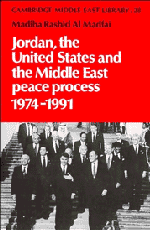Book contents
- Frontmatter
- Contents
- Foreword by William B. Quandt
- Acknowledgements
- Prologue
- 1 Introduction
- 2 Kissinger's legacy and imprint on the Middle East
- Part I Jordan in the Carter Middle East policy
- 3 Carter picks up the threads
- 4 The Camp David accords and Jordan
- 5 An evaluation of the development of American strategy for the 1980s
- Part II Jordan in the Reagan Middle East policy
- Part III US, Jordan and Arab approaches to peace
- Appendices
- Notes
- Select bibliography
- Index
- Cambridge Middle East Library
3 - Carter picks up the threads
Published online by Cambridge University Press: 25 February 2010
- Frontmatter
- Contents
- Foreword by William B. Quandt
- Acknowledgements
- Prologue
- 1 Introduction
- 2 Kissinger's legacy and imprint on the Middle East
- Part I Jordan in the Carter Middle East policy
- 3 Carter picks up the threads
- 4 The Camp David accords and Jordan
- 5 An evaluation of the development of American strategy for the 1980s
- Part II Jordan in the Reagan Middle East policy
- Part III US, Jordan and Arab approaches to peace
- Appendices
- Notes
- Select bibliography
- Index
- Cambridge Middle East Library
Summary
President Carter inherited a foreign policy ‘stalemated on the level of power, and excessively cynical on the level of principles’. Spurred by his proclaimed commitment to human rights, he saw no reasonable hope for a settlement of the Middle Eastern question without a homeland for the Palestinians. In frequent speeches he stressed that the type of settlement he envisaged would require an Israeli withdrawal to approximately the pre-1967 borderlines and the setting up of a Palestinian entity. Thus, at Aswan in Egypt, he declared on 4 January 1978 to the whole people of the Middle East,
There must be a resolution of the Palestinian problem in all its aspects. The problem must recognize the legitimate rights of the Palestinian people and enable the Palestinians to participate in the determination of their own future.
The Geneva conference: some working papers
Carter's first initiative was to replace Kissinger's previous step-by-step approach with a comprehensive one. It involved a multilateral peace effort with all the leading protagonists, including the Soviet Union, taking part, in order to deal collectively with the full range of issues on the basis of the implementation of Security Council Resolution 242 as a single package. The venue envisaged was Geneva, where the previous attempt at peace-making had been stalled by Kissinger. Leading up to this the US produced three statements. The major one issued in conjunction with the Soviet Union, which had co-chaired the previous Geneva Conference, was published on 1 October 1977.
- Type
- Chapter
- Information
- Publisher: Cambridge University PressPrint publication year: 1993



